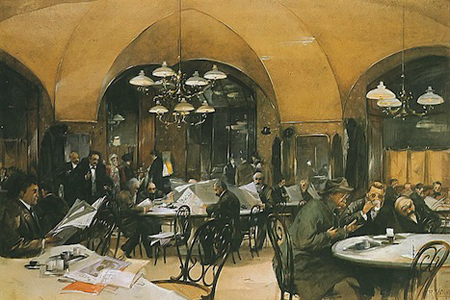When everything fell into parts…
This weekend I’ve enjoyed reading about Young Vienna, a group of Fin-de-Siecle writers who frequented Café Griensteidl and other coffeehouses in the Austro-Hungarian capital at the turn of the 20th century. The group included Stefan Zweig and Arthur Schnitzler, whose stream-of-consciousness writing prefigured Proust, Joyce and Woolf. According to Watson (2000), its coming together represented a pivotal moment in intellectual thought, at a time when the rigid sense of order defined by Newtonian physics was being challenged by the discovery of particles and quanta, and which coincided with increasingly Modernist influences in art and music, epitomised by Schoenberg’s experimentation with dissonance and atonality.
Another in the group, Hugo von Hofmannsthal suggested these epoch-defining events were defined by a shift towards multiplicity and indeterminacy. In describing his concept of ‘das Gleitende’ (the moving, the slipping, or the sliding), he declared:
“Everything fell into parts, the parts again into more parts, and nothing allowed itself to be embraced by concepts any more.”
(Quoted in Schorske, 1981: 19)
References
Schorske, C. (1981). Fin-de-Siecle Vienna: Politics and Culture. New York: Vintage Books
Watson, P. (2000). A Terrible Beauty: The People and Ideas that Shaped the Modern Mind. London: Orion
Image: Reinhold Voelkel | Café Griensteidl (1896)



February 20th, 2011 at 11:57 am
[...] This post was mentioned on Twitter by Luisa Maria Miguel, Andy Coverdale. Andy Coverdale said: New Post. When everything fell into parts… http://phdblog.net/when-everything-fell-into-parts…/ [...]
February 21st, 2011 at 5:36 pm
I currently am working on something called “partaged knowledge” which this points puts me in mind of. I took the term from the French “partage” which means to divide, but also to share. It seems that this is was what was happening in Vienna at the turn of the century as they divided and separated knowledge, but also realigned it to share it to create new meaning and perceptions.